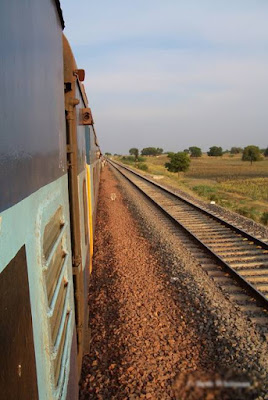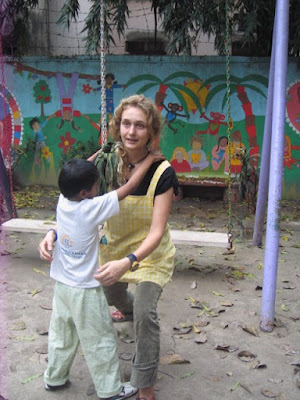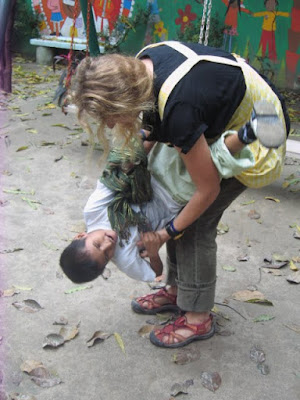
It is hard to tell which of the wallahs spend the thirty three hours walking up and down the carriages – and considering the twenty plus carriages I passed just to find my berth, I guess that the journey from chair class (where the passengers simply have a wooden bench to perch on) all the way to 2 AC (air conditioned bunks, with two beds pinned to each berth) could be done about once an hour – many miles walked. Others just jump on until the next station or until they have sold out and then they jump off refill and wait for the next train back to continue all over again.
Inside my little carriage I have successfully traded my middle bunk with the top bunk with an elderly gentleman. I am not sure if he was being polite or didn't actually want to climb to the top bunk, either way it worked out in my favour, as he roamed the carriages as the two guys who had boarded at two in the morning slept off their previous nights partying and refused to move off the bottom bunks - our seats.
The women stare at me. The lady opposite asked if I was from Europe. She said 'Jesus', and when asked for further elaboration, reminded me that Jesus was 'my' god. This made her think of Mother Teresa, and she asked if Mother was also from Scotland, although then she remembered that 'she was Indian'. Her travelling companion – the older gentlemen and father – seemed uncomfortable with our interaction, and she hasn't spoke to me since, although she did wake up Clara (my Spanish friend) at four in the morning to tell her to pray. The younger men all speak English, as does the ticket conductor, although he is a man of very few words and seems suspicious of my questions of which route the train will take to Pune, and when the next stop will be.
A gentleman sitting on the seat adjacent to us answers his mobile phone. He is talking in English describing his travelling companions: “two from Bihar, one from Pune, one from Mumbai” he pauses and then continues “there are also two foreigners” and reassuringly adds “but don't worry they have become quite friendly”. I smiled at myself at the realisation that I was not to feel threatened as apparently I was the one who was 'threatening'.
To an outsider the dynamics of the different generations combined with different social classes is incredibly intricate. In my booth of six people, consisting of the father and daughter (of now very few word)s, the two party-ers from last night, and Clara and I. The young guys share our jokes about 'chaiiiiiiii' and they stifle laughs at hacks and burps which fill the air from the other passengers, and which I do not even notice any more. They are comfortable with us, and quickly swap between Hindi and English. The elder gentlemen studies them closely, watching as one flicked through a 'Motor' magazine and the other plays an absorbing game on his ipod. He asked the young guys where they are going and if they are studying. They politely answer, their voice full of conditioned respect, but when they have done their duty, they change to English, and the old man turns his gaze to drift at the top of my laptop, with a scowl of contemptuous boredom. As the journey progressed he allowed his curiosity to wander to the every movement which Clara and I made. He meticulously studied us as we tried to eat the thousand seeds of a bright red pomegranate, so much so that self consciousness overwhelmed me, and I ended up spilling endless seeds all over the seat and floor.
What still strikes me is how comfortable seemingly ever class is with body contact of total strangers. Passengers sit tightly together, despite the comparative space. Telephone conversations are listened to eagerly by those with no newspapers or books to read, and it reminds me again of the sense of privacy and personal space which we have managed to cultivate and consequently treat as inappropriately sacred. Paranoia of stories of stolen luggage means that both of my bags are chained under the seats/bottom bed, but thirty hours is still an eternity to remain cautious, and soon I am drifting with my day dreams which take me out the train window and into the country which chugs by.
Framed by train tracks and broken bustee brick roofs patched with tarpaulin, bright lively colours of washed saris, playing kids and grazing water buffaloes covered with drying mud. The scene is repeated hour after hour with the only difference being the back drop of mosques or temples. The duration of the day is continuously marked by the wallahs, and reminders of the stifling air in the carriages is sang out by the calls of 'ice cream'. Lunch comes on trays of walking 'roti and dhosas' followed by plastic wire baskets of 'cream biscuit, bourbon biscuit, snacks, SNACKS!'. Dinner is marked by 'cigarettes and samosas' as well as the rather ubiquitous in-train catering staff, who march the length of the train wearing their tartan uniforms and back to front caps, with the name badge, 'meals on wheels'. They are selling veg and non-veg dinner trays, creating a second of tension as the guys on our booth order 'non-veg' to which the daughter comments 'live vegetarian – eat vegetarian'.
The thirty three hour journey carries its city of passengers across the length of the country in a melody of songs and of food, where one thousand strangers break the boredom through finding commonalities and enforced unconscious intimacy.





















